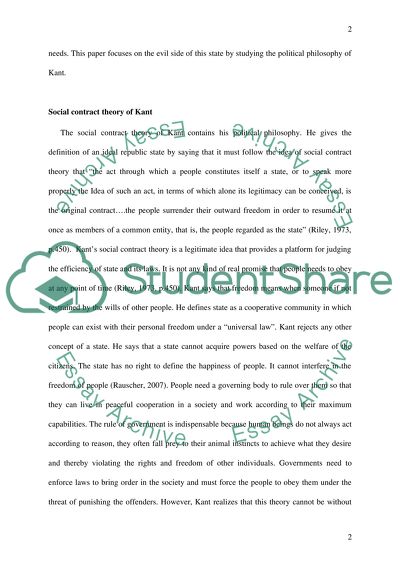Cite this document
(Social Contract Theory Assignment Example | Topics and Well Written Essays - 2500 words, n.d.)
Social Contract Theory Assignment Example | Topics and Well Written Essays - 2500 words. https://studentshare.org/sociology/1591304-social-contract-theory-suggests-that-people-enter-into-society-as-fully-formed-individuals-to-satisfy-their-pre-social-needsthis-the-state-is-always-regarded-as-a-necessary-evildiscuss-how-this-idea-is-mapped-out-in-the-political-philosophy-of-kant-how
Social Contract Theory Assignment Example | Topics and Well Written Essays - 2500 words. https://studentshare.org/sociology/1591304-social-contract-theory-suggests-that-people-enter-into-society-as-fully-formed-individuals-to-satisfy-their-pre-social-needsthis-the-state-is-always-regarded-as-a-necessary-evildiscuss-how-this-idea-is-mapped-out-in-the-political-philosophy-of-kant-how
(Social Contract Theory Assignment Example | Topics and Well Written Essays - 2500 Words)
Social Contract Theory Assignment Example | Topics and Well Written Essays - 2500 Words. https://studentshare.org/sociology/1591304-social-contract-theory-suggests-that-people-enter-into-society-as-fully-formed-individuals-to-satisfy-their-pre-social-needsthis-the-state-is-always-regarded-as-a-necessary-evildiscuss-how-this-idea-is-mapped-out-in-the-political-philosophy-of-kant-how.
Social Contract Theory Assignment Example | Topics and Well Written Essays - 2500 Words. https://studentshare.org/sociology/1591304-social-contract-theory-suggests-that-people-enter-into-society-as-fully-formed-individuals-to-satisfy-their-pre-social-needsthis-the-state-is-always-regarded-as-a-necessary-evildiscuss-how-this-idea-is-mapped-out-in-the-political-philosophy-of-kant-how.
“Social Contract Theory Assignment Example | Topics and Well Written Essays - 2500 Words”. https://studentshare.org/sociology/1591304-social-contract-theory-suggests-that-people-enter-into-society-as-fully-formed-individuals-to-satisfy-their-pre-social-needsthis-the-state-is-always-regarded-as-a-necessary-evildiscuss-how-this-idea-is-mapped-out-in-the-political-philosophy-of-kant-how.


